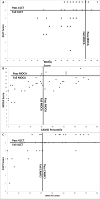Comparison of three cognitive exams in cardiac arrest survivors
- PMID: 28511984
- PMCID: PMC7702001
- DOI: 10.1016/j.resuscitation.2017.04.011
Comparison of three cognitive exams in cardiac arrest survivors
Erratum in
-
Corrigendum to "Comparison of three cognitive exams in cardiac arrest survivors" [Resuscitation 116 (2017) 98-104].Resuscitation. 2017 Dec;121:215-216. doi: 10.1016/j.resuscitation.2017.09.015. Epub 2017 Oct 13. Resuscitation. 2017. PMID: 29033029 No abstract available.
Abstract
Background: Cognitive deficits may detract from quality of life after cardiac arrest. Their pattern and prevalence are not well documented. We used the Computer Assessment of Mild Cognitive Impairment (CAMCI), the Montreal Cognitive Assessment (MOCA) and the 41 Cent Test (41CT) to assess cognitive impairment in cardiac arrest survivors and examine the exams' diagnostic accuracy. We hypothesized that the scores of these exams would indicate the presence of cognitive impairment in arrest survivors, that the overall scores on the three study assessments would correlate with one another, and that the 41CT, MOCA, and executive function element of the CAMCI would vary independently from other non-executive CAMCI components, reflecting executive function impairment after cardiac arrest.
Methods: Four researchers administered the CAMCI, MOCA, and/or the 41CT to cardiac arrest survivors after discharge from the intensive care unit between 2010 and 2015. Physicians screened patients with the Mini-Mental State Exam to determine when this cognitive testing was feasible, generally when the patient was able to score 20-25 points on the MMSE. We performed pairwise correlations between the different subscales' and tests' scores.
Results: One hundred and fourteen participants completed the CAMCI, of which 38 (33.3%) participants additionally completed the MOCA and 41CT. The median (IQR) percentile score for CAMCI for all 114 participants was 33.5 (18.3, 49.8), which corresponds to moderately low risk of impairment. The median (IQR) for the MOCA was 22.0 (19, 24.8) out of a possible 30, which is considered indicative of abnormal cognitive function, and for the 41CT was 6 (5, 7) out of a possible 7 points when all 38 participants were included. MOCA correlated strongly with the overall CAMCI score (r=0.71); the CAMCI correlated moderately strongly with the 41CT (r=0.62) and the MOCA and 41CT were moderately strongly correlated with each other (r=0.56). When all 114 CAMCI scores were considered, the Executive Accuracy subscale was strongly correlated with the overall CAMCI score (r=0.81).
Conclusion: The CAMCI detects cognitive impairment after cardiac arrest. The MOCA correlates strongly with the overall CAMCI and the executive function subscale of the CAMCI. The 41CT as appears less effective than the MOCA in detecting cognitive deficits.
Keywords: Cardiac arrest; Cognitive assessment; Neurcognition.
Copyright © 2017 Elsevier B.V. All rights reserved.
Conflict of interest statement
The authors report no conflicts of interest related to this work.
Figures
Comment in
-
What you ask for is what you get: A practical approach for early cognitive screening and the potential for individualized support after cardiac arrest.Resuscitation. 2017 Jul;116:A5-A6. doi: 10.1016/j.resuscitation.2017.05.007. Epub 2017 May 10. Resuscitation. 2017. PMID: 28501591 No abstract available.
References
-
- Bunch TJ, White RD, Smith GE, Hodge DO, Gersh BJ, Hammill SC, Shen W, Packer DL. Long-term subjective memory function in ventricular fibrillation out-of-hospital cardiac arrest survivors resuscitated by early defibrillation. Resuscitation. 2004;60:189–195. - PubMed
-
- O’Reilly SM, Grubb NR, O’Carroll RE. In-hospital cardiac arrest leads to chronic memory impairment. Resuscitation. 2003;58:73–79. - PubMed
Publication types
MeSH terms
Grants and funding
LinkOut - more resources
Full Text Sources
Other Literature Sources
Medical




